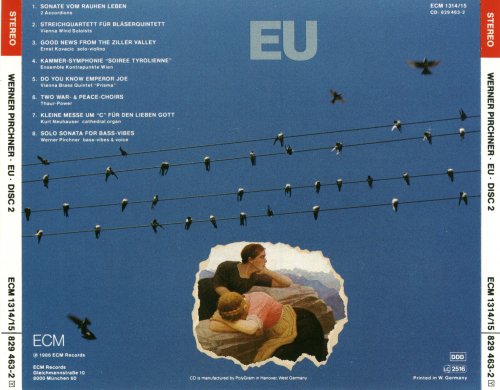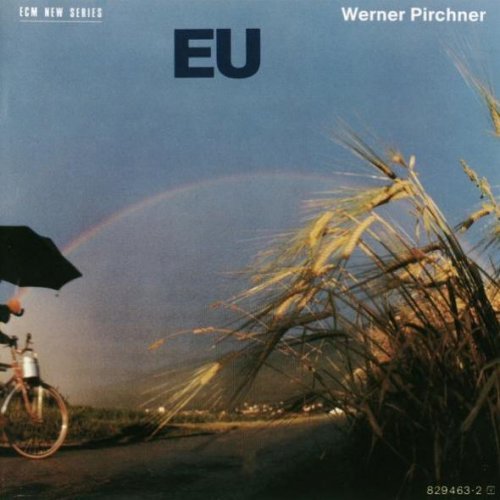
Werner Pirchner - EU (1986) CD-Rip
BAND/ARTIST: Werner Pirchner
- Title: EU
- Year Of Release: 1985
- Label: ECM New Series
- Genre: Classical, Jazz
- Quality: FLAC (tracks+.cue,log,scans)
- Total Time: 01:39:27
- Total Size: 488 Mb
- WebSite: Album Preview
Tracklist:
CD 1:
01. Sonate vom rauhen Leben pt. I
02. Sonate vom rauhen Leben pt. II
03. Sonate vom rauhen Leben pt. III
04. Sonate vom rauhen Leben pt. IV
05. Streichquartett fur Blaserquintett
06. Good news from the Ziller Valley pt. I
07. Good news from the Ziller Valley pt. II
08. Good news from the Ziller Valley pt. III
09. Kammer-Symphonie 'Soiree Tyrolienne' pt.I
10. Kammer-Symphonie 'Soiree Tyrolienne' pt.II
11. Kammer-Symphonie 'Soiree Tyrolienne' pt.III
12. Kammer-Symphonie 'Soiree Tyrolienne' pt.IV
CD 2:
01. Do you know Emperor Joe pt. I
02. Do you know Emperor Joe pt. II
03. Do you know Emperor Joe pt. III
04. Do you know Emperor Joe pt. IV
05. Do you know Emperor Joe pt. V
06. Two war-& peace-choirs pt. I
07. Two war-& peace-choirs pt. II
08. Kleine Messe um 'C' fur den lieben Gott
09. Solo sonata for bass-vibes pt. I
10. Solo sonata for bass-vibes pt. II
11. Solo sonata for bass-vibes pt. III
12. Solo sonata for bass-vibes pt. IV
Personnel:
Werner Pirchner (vocals, accordion, bells)
Heinrich Wolf (tenor)
Nancy Wu, Herbert Zils, Ernst Kovacic (violin)
Wolfgang Schulz (flute)
Peter Schmidl, Hans Moser (clarinet)
Gerhard Turetschek (oboe)
Michael Turnovsky, Eckehard Fintl (English horn)
Fritz Faltl (bassoon)
Horst Kubelbock (bass trombone)
Nickolaus Schafferer (tuba)
Hansjцrg Angerer, Volker Altmann, Erwin Sukar (horns)
Rainer Keuschnig (piano); Gerald Fromme (percussion)
Elfi Pirchner (bells).

CD 1:
01. Sonate vom rauhen Leben pt. I
02. Sonate vom rauhen Leben pt. II
03. Sonate vom rauhen Leben pt. III
04. Sonate vom rauhen Leben pt. IV
05. Streichquartett fur Blaserquintett
06. Good news from the Ziller Valley pt. I
07. Good news from the Ziller Valley pt. II
08. Good news from the Ziller Valley pt. III
09. Kammer-Symphonie 'Soiree Tyrolienne' pt.I
10. Kammer-Symphonie 'Soiree Tyrolienne' pt.II
11. Kammer-Symphonie 'Soiree Tyrolienne' pt.III
12. Kammer-Symphonie 'Soiree Tyrolienne' pt.IV
CD 2:
01. Do you know Emperor Joe pt. I
02. Do you know Emperor Joe pt. II
03. Do you know Emperor Joe pt. III
04. Do you know Emperor Joe pt. IV
05. Do you know Emperor Joe pt. V
06. Two war-& peace-choirs pt. I
07. Two war-& peace-choirs pt. II
08. Kleine Messe um 'C' fur den lieben Gott
09. Solo sonata for bass-vibes pt. I
10. Solo sonata for bass-vibes pt. II
11. Solo sonata for bass-vibes pt. III
12. Solo sonata for bass-vibes pt. IV
Personnel:
Werner Pirchner (vocals, accordion, bells)
Heinrich Wolf (tenor)
Nancy Wu, Herbert Zils, Ernst Kovacic (violin)
Wolfgang Schulz (flute)
Peter Schmidl, Hans Moser (clarinet)
Gerhard Turetschek (oboe)
Michael Turnovsky, Eckehard Fintl (English horn)
Fritz Faltl (bassoon)
Horst Kubelbock (bass trombone)
Nickolaus Schafferer (tuba)
Hansjцrg Angerer, Volker Altmann, Erwin Sukar (horns)
Rainer Keuschnig (piano); Gerald Fromme (percussion)
Elfi Pirchner (bells).
Werner Pirchner (1940-2001) is not a name likely to be well known outside of his native Austria. A multi-instrumentalist with strong jazz roots, Pirchner devoted much energy in the latter part of his life to strict composition, leaving behind an oeuvre of 130 works. This double album, one of the earliest in ECM’s New Series, is a delightful potpourri and a charming record of a unique musical career.
The Sonate Vom Rauhen Leben (Sonata of a Harsh Life) features the composer on the accordion. The music is mysterious, like folk music from afar. Pirchner’s playing is elegiac, highly descriptive, and paints with dense strokes. Loneliness mounts with each section, as if the music were resigned to live and die for itself. Streichquartett Für Bläserquintett (String Quartet for Wind Quintet) balances playful abstraction with comic determination, harrumphing its way through a slideshow of waltzes and tongue-in-cheek adventures. All the more satirical given that Pirchner uses a Tyrolean slave song as its thematic core. The music sounds like a wind section without orchestra, so vast is its implied periphery. Next is Good News From The Ziller Valley, a three-part jig for solo violin that abounds in microtonal harmonies. This is followed by the pointillist Kammer-Symphonie “Soirée Tyrolienne”, a programmatic exposition that sounds like it belongs in a ballet or stage production. Do You Know Emperor Joe is a series of delightfully syncopated vignettes for brass ensemble. This pieces bears its dedication to “Joseph II., the only monarch with the nickname ‘Menschenfreund’ and to Fritz v. Herzmanovsky-Orlando, author of ‘Kaiser Joseph and the Station-Master’s Daughter.’” The audience in this live recording is in stitches and seems to be enjoying itself thoroughly, making us wonder what we missed by not having been there. The mood changes with Two War-& Peace-Choirs, the first of which sounds like something out of Meredith Monk’s vocal world, while the second revels more overtly in the feel of its text—especially in its trilled Rs—and ends with a humorous “Amen” from a deep bass. This is appropriately followed by Kleine Messe Um “C” Für Den Lieben Gott, a dirge for solo organ that seems to pick up on a grander scale where the accordion left off at the album’s intimate beginnings. We end with the brilliant Solo Sonata for Bass-Vibes, played to perfection again by our composer.
It’s hard to know what of make of EU. On the one hand it’s a fascinating cross-section of a very idiosyncratic composer. Pirchner’s innovative approach is apparent at every turn and escorts his listeners through an amusement park of moods. On the other hand some of the pieces do drag on a bit, making sustained interest an occasional issue. Pirchner embodies a unique paradox: where some minimalist composers take repetitive motives and make them sound highly varied, he somehow takes a wide variety of musical elements and makes them sound repetitive. At its best moments Pirchner’s music is uninhibited and just plain fun; at its worst it feels ultimately insubstantial, like an afternoon nap cut short. That being said, the music is also fraught with pauses, leaving much time for listeners to ponder the implications of what they’re hearing. Pirchner’s skills are particularly obvious in the shorter pieces, his bass-vibes sonata the clear standout in this regard. Part III of the selfsame sonata is a stroke of genius matched by an equal level of performance. And speaking of performance, the musicianship, tuning, and recording quality throughout are positively superb.
As I bask in the whimsy of EU for this review, a summer thunderstorm unleashes its ominous fury over my roof, providing a stark contrast to the delightful sounds in my ears. This seems like just the sort of irony that Pirchner would appreciate, one that milks the unpredictability of life for all it’s worth and says in response, “Yeah, I can work with that.”
Incidentally, for a wonderful rumination on Pirchner and his music, check out Stephen Smoliar’s post at The Rehearsal Studio.
The Sonate Vom Rauhen Leben (Sonata of a Harsh Life) features the composer on the accordion. The music is mysterious, like folk music from afar. Pirchner’s playing is elegiac, highly descriptive, and paints with dense strokes. Loneliness mounts with each section, as if the music were resigned to live and die for itself. Streichquartett Für Bläserquintett (String Quartet for Wind Quintet) balances playful abstraction with comic determination, harrumphing its way through a slideshow of waltzes and tongue-in-cheek adventures. All the more satirical given that Pirchner uses a Tyrolean slave song as its thematic core. The music sounds like a wind section without orchestra, so vast is its implied periphery. Next is Good News From The Ziller Valley, a three-part jig for solo violin that abounds in microtonal harmonies. This is followed by the pointillist Kammer-Symphonie “Soirée Tyrolienne”, a programmatic exposition that sounds like it belongs in a ballet or stage production. Do You Know Emperor Joe is a series of delightfully syncopated vignettes for brass ensemble. This pieces bears its dedication to “Joseph II., the only monarch with the nickname ‘Menschenfreund’ and to Fritz v. Herzmanovsky-Orlando, author of ‘Kaiser Joseph and the Station-Master’s Daughter.’” The audience in this live recording is in stitches and seems to be enjoying itself thoroughly, making us wonder what we missed by not having been there. The mood changes with Two War-& Peace-Choirs, the first of which sounds like something out of Meredith Monk’s vocal world, while the second revels more overtly in the feel of its text—especially in its trilled Rs—and ends with a humorous “Amen” from a deep bass. This is appropriately followed by Kleine Messe Um “C” Für Den Lieben Gott, a dirge for solo organ that seems to pick up on a grander scale where the accordion left off at the album’s intimate beginnings. We end with the brilliant Solo Sonata for Bass-Vibes, played to perfection again by our composer.
It’s hard to know what of make of EU. On the one hand it’s a fascinating cross-section of a very idiosyncratic composer. Pirchner’s innovative approach is apparent at every turn and escorts his listeners through an amusement park of moods. On the other hand some of the pieces do drag on a bit, making sustained interest an occasional issue. Pirchner embodies a unique paradox: where some minimalist composers take repetitive motives and make them sound highly varied, he somehow takes a wide variety of musical elements and makes them sound repetitive. At its best moments Pirchner’s music is uninhibited and just plain fun; at its worst it feels ultimately insubstantial, like an afternoon nap cut short. That being said, the music is also fraught with pauses, leaving much time for listeners to ponder the implications of what they’re hearing. Pirchner’s skills are particularly obvious in the shorter pieces, his bass-vibes sonata the clear standout in this regard. Part III of the selfsame sonata is a stroke of genius matched by an equal level of performance. And speaking of performance, the musicianship, tuning, and recording quality throughout are positively superb.
As I bask in the whimsy of EU for this review, a summer thunderstorm unleashes its ominous fury over my roof, providing a stark contrast to the delightful sounds in my ears. This seems like just the sort of irony that Pirchner would appreciate, one that milks the unpredictability of life for all it’s worth and says in response, “Yeah, I can work with that.”
Incidentally, for a wonderful rumination on Pirchner and his music, check out Stephen Smoliar’s post at The Rehearsal Studio.

As a ISRA.CLOUD's PREMIUM member you will have the following benefits:
- Unlimited high speed downloads
- Download directly without waiting time
- Unlimited parallel downloads
- Support for download accelerators
- No advertising
- Resume broken downloads


